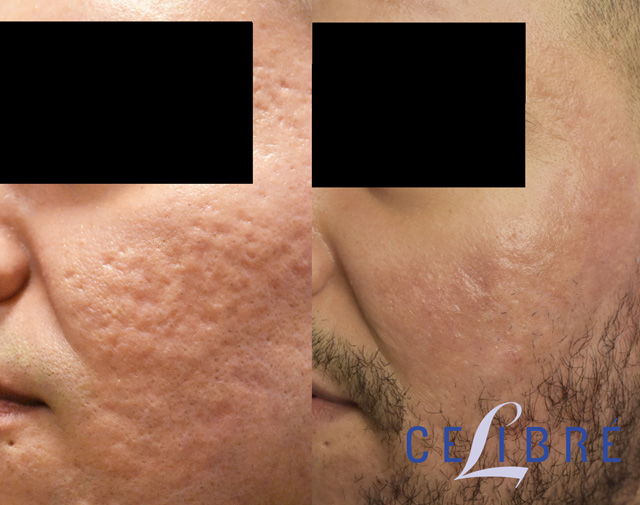Acne scars are a concerning after-effect of past acne breakouts. Our patients seek effective products and treatments for improving their acne scars. Acne scars exist in various forms such as surface indentations, pinpoint holes as well as red and brown discoloration. Suitable treatment methods depend on your skin and scar type.
Acne Scars Overview
Skin damage from inflamed pimples leads to textured and colored acne scars. The body creates too much or too little collagen during the healing process which can result in textural changes and discoloration.

There are a few main types of acne scars:
- The atrophic scars which include ice pick and boxcar scars create – sunken areas in the skin.
- Hypertrophic scars that are raised or thick such as keloids.
- Dark spots and redness. Also called post-inflammatory hyperpigmentation.
Different skin types may need different treatments which makes skin type identification essential for choosing the best acne scar removal method.
What Gets Rid of Acne Scars?
If you want to see quick results then professional treatments will provide the most rapid changes. Dermatologists often recommend options like:
- Fractional laser resurfacing removes damaged skin while activating collagen production which makes it perfect for treating deeper textured acne scars.
- TCA cross (trichloroacetic acid) solution is a treatment for improving sharp edged textured scars such as boxcar scars.
- Topical products like Retin A and glycolic acid products remove the surface layer of skin, helping to reduce dark spots and redness by increasing the rate at which the skin cells reproduce.
These options offer improvement for acne scars and work well for stubborn, older marks. Results may take multiple sessions, and downtime can vary.
What Treatment Gets Rid of Acne Scars?
Medical-level results can be achieved through dermatologist-approved procedures.
Laser treatments such as CO2, Erbium and Fractional lasers are often the most effective options for treating deeper and older acne scars.
- Chemical Peels (Glycolic or TCA): Help fade red and dark acne scars.
- Dermal Fillers (hyaluronic acid and Sculptra): Add volume to indented areas for smoother skin.
- Subcision: Breaks fibrotic tissue that tethers deep scars.
These in-office treatments help remove deep acne scars while delivering both texture and color enhancement to our patients.
What Products Get Rid of Acne Scars?
People who prefer home treatments can achieve skin discoloration reduction and texture improvement through particular ingredients and products. The following products work best to improve acne scars when you use them regularly. The products succeed in fading skin discoloration but they do not work on removing deeper textured acne scars.
Look for these key components:
- Retinol: Boosts skin turnover and smooths rough texture.
- Vitamin C: Brightens dark spots and improves overall tone.
- Niacinamide: Reduces inflammation and redness.
- Alpha Hydroxy Acids (AHA/BHA): Exfoliate and renew the surface layer.
- Hydroquinone or Kojic Acid: Target stubborn pigmentation.
What Serum Gets Rid of Acne Scars?
Serums function as lighter skin treatments which can reach deeper than creams to effectively improve discoloration and blemishes. The most effective serums for removing acne scars contain hydroquinone, Vitamin C, Retin A (Retinol) and Niacinamide.
The solution for treating dark acne scars is hydroquinone. The value of the product is dependent on how much active acne is present. If active acne has stopped, then hydroquinone is very effective at getting rid of older brown blemishes. Red scars respond well to Retin A, retinol and Vitamin C serum. Treatments often require our patients to use the products for 6 to 8 weeks before seeing noticeable improvement.
Does Vitamin C Get Rid of Acne Scars?
Acne scar repair is supported with the use of Vitamins, including:
- Vitamin C functions to stimulate collagen production while it also works to enhance skin radiance.
- Vitamin E promotes tissue restoration in areas where damage has occurred.
- Vitamin A (Retinoids) – speeds up skin renewal and reproduction.
- Vitamin B3 (Niacinamide) – reduces dark spots and redness.
Taking these vitamins—through diet or skincare—can help improve acne scars naturally over time.
What Gets Rid of Acne Scars Naturally?
The search for natural scar lightening solutions has led to several effective home remedies which produce gradual results through their application. These options are less effective than the laser treatments and prescription products mentioned above.
- Aloe Vera provides relief to the skin while it speeds up the recovery process.
- Rosehip Oil contains Vitamin A and C which promotes skin regeneration.
- Turmeric masks may provide dual benefits because they reduce inflammation while enhancing skin brightness.
The at-home acne scar treatments mentioned above help with skin tone and moisture improvement but they perform best on light skin discoloration rather than deep skin depressions and textured acne scars.
What Gets Rid of Red and Dark Acne Scars?
Treatments for red acne scars need different approaches than dark acne scars because they require distinct care methods.
- The treatment for red scars requires products that reduce inflammation and promote healing such as niacinamide and azelaic acid and lasers such as the Vbeam pulsed dye laser.
- The most effective treatment for dark scars involves brightening ingredients which include prescription hydroquinone, Vitamin C and glycolic/salicylic acid.
The key to removing dark spots and red acne scars involves regular skin exfoliation together with proper sun protection. Wearing SPF every day is essential because sunlight exposure creates darker scars that become more pronounced.
What Gets Rid of Back Acne Scars?
Back acne scars tend to be difficult to treat because the skin on your back is different than the face. Regular exfoliation helps, but for deeper textured scars, results for laser treatments are limited. You can also try body washes with salicylic acid or glycolic acid to fade discoloration.
How to Choose the Right Option for Acne Scars?
The treatment method needs to match your skin and scar type and your desired time frame for healing.
- The treatment for mild dark (or red) spots begins with hydroquinone, serums and exfoliating acids.
- The treatment of deep acne scars requires professional medical care, including lasers, to achieve successful results.
- The above treatments allow patients to combine clinical care with home-based brightening skincare options.
The safety of acne scar removal for your face requires a medical professional’s evaluation.
Prevention Tips
The prevention of new acne scars is equally important as the treatment of existing scars.
- Avoid the temptation to pop or squeeze your pimples.
- The use of sunscreen on a daily basis will help you stop your brown acne scars from becoming darker.
- Stick to a simple skincare routine which you can follow consistently and every day.
- Early acne treatment helps reduce the development of permanent scars.
Before and After Pictures of Acne Scars

The process of achieving results requires time regardless of which acne scar product or treatment you decide on. Medical treatments start to show results during the first few weeks but at-home care can require several months to show results. The key is consistency and patience—acne scars can fade, but not overnight.
Conclusion
What gets rid of acne scars? Our patients achieve improvement of acne scars through the combination of medical treatments, skin care products, and beneficial habits. The path to getting rid of acne scars leads through laser therapy for deep acne scars, as well as hydroquinone, Retin A, lasers and Vitamin C serum for red or brown acne spots.

